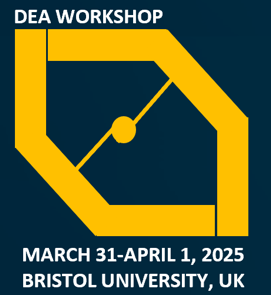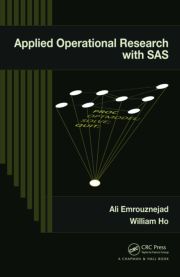Guest editors:
Ali Emrouznejad, Surrey Business School, The University of Surrey, Guildford, UK,
Vincent Charles, School of Management, University of Bradford, Bradford, UK,
Submission deadline: July 31, 2022

The twenty-first century demands an urgent balance of economic and social development, as well as environmental protection and stewardship. Higher energy consumption is required to support the continued growth of the human population and rising living standards. However, this primarily leads to increased pollution and waste from industrial, agricultural, and construction activities alike, to name a few. Moreover, the public‘s attention is increasingly focused on addressing environmental problems caused by pollution, such as GHG emissions, which in turn has increased the focus on environmental efficiency evaluation in recent years.
Stochastic Data Envelopment Analysis (SDEA) can assist in determining how to achieve this balance. Data envelopment analysis (DEA) is a popular tool for analysing and measuring efficiency in both the public and private sectors. DEA considers multiple-input and multiple-output situations and compares the relative efficiency of factor input and output of multiple similar entities, also known as decision-making units (DMUs). In its original configuration, DEA is a non-stochastic tool that assumes all input and output data are quantitative, with specified numerical values; in other words, they are both deterministic and noise-free. In real-world applications, however, inputs and outputs are frequently of a stochastic nature, fluctuating over time, making it difficult to establish precise numbers for them based on the limited historical data. The introduction of SDEA, in which the possibility of noise in the data and the consideration of measurement errors and specification errors are explicitly taken into account, has been found to be efficient in dealing with and measuring the uncertainties in one or more DMUs.
The purpose of an SDEA approach under these circumstances is straightforward. Achieving environmental sustainability is fraught with uncertainty, which can manifest itself in a variety of ways, including process activities, resource consumption, and emissions across the value chain, among other things. The outstanding feature of most existing studies dealing with environmental efficiency analysis is that they model variables such as wasting water, GHG emissions, the production of useless solid materials, etc. as deterministic variables. As mentioned, DEA models with stochastic settings have been developed to accommodate both inefficiency and the presence of noise, measurement errors, and specification errors. But then again, despite substantial progress with SDEA approaches, research focusing on the use of SDEA to address environmental efficiency across domains is rather scarce.
Against this background, this Special Issue aims to compile original research articles of high quality that focus on recent advancements in SDEA and environmental efficiency applications. Theoretical, conceptual, methodological, and empirical research studies are all of interest. Contributions from both the academic and the practitioner communities are encouraged. In order to not only bring together the most recent knowledge but also to close the gap between scientific research and practical impact, we especially encourage contributions that are implementation-focused, i.e., with real-world data experiments, pilots, and industry collaborations.
Specific topics/applications of interest include, but are not limited to:
- Environmental efficiency of countries and regions
- Environmental efficiency of energy and carbon dioxide emissions
- Environmental efficiency of regional or national energy production
- Environmental efficiency in the context of the green economy or circular economy and the sustainability of supply chains
- Environmental efficiency of manufacturing firms
- Environmental efficiency of construction companies
- Environmental efficiency of maritime companies
- Environmental efficiency of container ports
- Environmental efficiency of (electric) fossil fuels
- Environmental efficiency of oil and gas companies
- Environmental efficiency of chemical and pharmaceutical companies
- Environmental efficiency of regional or national transportation systems
- Environmental efficiency in agriculture (at farm-level, crop-level, etc.)
- Environmental efficiency in aviation
Specific methods of interest include, but are not limited to:
- Stochastic DEA (with a consideration of stochastic inputs and outputs, desirable and undesirable stochastic inputs and outputs, etc.)
- Stochastic cross-efficiency DEA
- Stochastic network DEA
- Chance-constrained DEA
- Satisficing DEA
- Stochastic frontier analysis
- Stochastic programming
- StoNED DEA
- State-contingent approaches
Submission Guidelines and Review Process:
Papers must be submitted at http://www.editorialmanager.com/orsp/ by July 31st, 2023. Authors should select “S.I.: Stochastic DEA & Environmental Efficiency” during the submission step ‘Additional Information.’ All papers submitted to this special issue should report original work and contribute to the journal OR Spectrum by using a quantitative research paradigm and OR methods. According to the aims of OR Spectrum, high quality papers are sought that match the scope of the journal, demonstrate rigor in the application of state-of-the-art OR techniques, and promise to impact the future work of the OR community.
Papers will be screened by the Editor-in-Chief and one Special Issue Editor. If the paper is deemed to be of sufficient quality, it will be peer-reviewed according to the standards of OR Spectrum by at least two experienced reviewers. We will adopt a rapid and fair review process, striving to provide reviews within three months of submission. Accepted papers will be available online prior to publication of the special issue.
Special Issue Editors:
| Professor A. Emrouznejad a.emrouznejad@surrey.ac.uk Surrey Business School, The University of Surrey, Guildford, UK | Professor V. Charles c.vincent3@bradford.ac.uk School of Management, University of Bradford, Bradford, UK |















